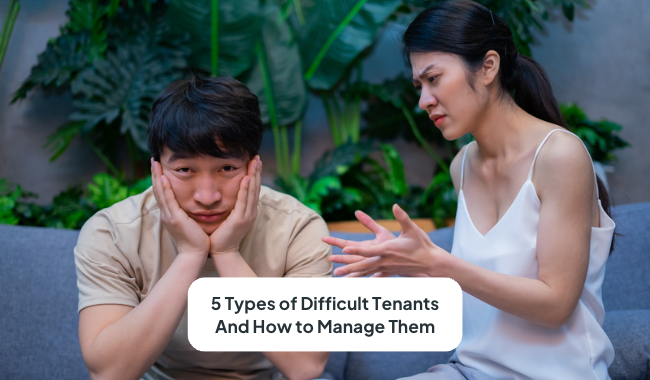Renting out your home and becoming a landlord can be fruitful and frustrating. On one hand, you’re earning rental income (yay!) and on the other, you’re spending hours and hours having to deal with difficult tenants (boo!).
Whether it’s constantly late rent payments, disruptive behaviour, or damage to the property, difficult tenants can make your life something close to a living hell.
But by understanding the different types of tenants you may encounter and learning how to effectively manage them, you can minimise the negative impact they have on your life and on your property.
In this article, we’ll explore 5 common types of difficult tenants and provide tips on how to effectively handle each one.
#1: The Rule Bender

When a tenant signs the Tenancy Agreement (TA), they are agreeing to the various conditions stated within it and are subject to compensation, intervention, or eviction, depending on the nature and extent of each violated clause.
From secret pet-rearing in a no-pet policy agreement, or having more family members than initially declared live with them, there are all kinds of “creative” ways a tenant may try to bend the rules short of committing an actual crime. Some may even try to guilt trip you to “close one eye” when they bend any of your stated conditions or don’t follow the TA to a T, so be firm and stick to your TA.
Then there are the outright lawbreakers who conduct criminal activities within your property. They could be involved with drugs, whether as a user or peddler, or engage in other illegal or unspeakable activities in your unit. In such extreme or dangerous cases, you should alert the police instead of getting into the thick of things. In other cases, you may want to swiftly evict the tenant or get a good lawyer involved with a court-ordered eviction.
#2: The Rent Procrastinator

The Rent Procrastinator always pays rent late, pays only partially, or tries to avoid paying rent at all. And who wants to keep chasing something you’re legally owed?
Your TA should clearly indicate payment due dates, as well as any countermeasures that will be taken in the event that rent is late. Most tenancy agreements impose a late fee; you can charge about 5-10% of the monthly rent for this, in line with HDB’s 7.5% late fee for rentals.
If this becomes a recurring pattern for more than 2 consecutive months, speak with your tenant to find out what the hold-up is and try to work out a solution. Sometimes it could be as simple as their payday being on the 7th of the month while rent is due on the 1st of each month.
In cases where the tenant is obviously trying to evade rent, issue them a notice to pay up or move out, so they know you mean business.
A security deposit will go a long way in ensuring you don’t make too much of a loss in these cases. So be sure to secure an amount that is substantial enough to ease your rental losses. Landlords typically collect a security deposit worth 1 month’s rental.
#3: The Secret Subletter
HDB flats are meant to be affordable housing, not investment properties. As a landlord, you need to understand certain restrictions on rental and subletting so you do not get into trouble.
| Rental Violations | What It’s About |
| Rent out your entire flat during MOP. | This is not allowed. While you may rent out spare bedrooms, rental regulations will apply. |
| Lock one room to pretend you are living in it. | You must occupy at least one bedroom and make sure each tenant leases for at least 6 months. |
| Owners in proxy | Getting tenants to pretend they are owners. |
| Illegal immigrants | All tenants must have legal permits to live in Singapore. |
| Exceeding Non-Citizen Quota | You need to adhere to the Non-Citizen Quota if your tenants are non-Malaysian Singapore PRs or foreigners. |
| Rent out your entire flat after MOP. | Only Singaporeans can rent out the entire HDB, but both Singaporeans and PRs can sublet spare bedrooms. |
| Extending the lease for sublets. | The maximum HDB subletting period is three years per application if the tenants are Singaporeans or Malaysians, and two years for others. |
| Exceeding maximum number of tenants. | 1 and 2-room flats allow up to 4 tenants. 3-room and bigger allow 6. |
You should take necessary precautions to ensure your tenants aren’t masquerading as owners and/or subletting without your knowledge to cover the cost of their own rent or to make a quick buck.
READ MORE: A Quick Guide on Regulations of Renting a Property
4. The Self-Declared Designer

This tenant gets way too comfy in your rental property and starts making alterations to customise your flat to their personal preferences. Some of these alterations may actually make the house look better, but any permanent changes should have your approval before they are executed. If you don’t like the changes that are being made, the TA (once again) is your greatest weapon in demanding that the tenants reinstate your flat to its original condition.
That is why you should make sure you have a watertight lease agreement that covers all your expectations in terms of maintenance, approved decorations or alterations to your unit, and what measures would be taken should the tenant breach any of them.
It is also wise to take “before” photos of each and every room in the house so you have a clear point of reference when you are doing your final inspection when the lease is up, and so you also have pictorial evidence of what the house was like in its original state.
Similarly, a substantial security deposit may help with repair costs for damage your tenant may cause to your property. Security deposits are typically one month’s rent for a 12-month lease or 2 months’ rent for a 24-month lease
5. The Nitpicker

While The Nitpicker may not give you any legal trouble or breach any of the clauses in your TA, they can be quite troublesome.
While it is completely reasonable for your tenant to be calling you about severe maintenance issues like leaking gas pipes, a ceiling threatening to cave in, or any other potentially dangerous issues that require urgent attention, they shouldn’t be bothering you with issues like a loose door knob, the design of your property not being to their liking, and other superfluous complaints.
Draw a clear line and set clear boundaries. If it is an actual emergency, your immediate response is necessary. Beyond that, you are not legally obliged to attend to your tenants’ every whim and fancy. When the lease is due for renewal, you may also want to reconsider renewing with The Nitpicker and discern if they are worth the stress and effort.
But you know the best way to avoid handing over your home keys to a tenant who may one day prove to be difficult? Screen all your enquiries and offers thoroughly and you’ll save yourself from the hassle of having to manage a tenant who’s not the easiest to deal with. Although, having a difficult tenant may be better than not having one at all…
If you’re having trouble finding a tenant at all, let us help you!
You can list your property on the Ohmyhome app here and our smart data-matching technology will send your listing to tenants looking to lease a place in your area.
If you prefer having the assistance of a property agent, you can take a look at our property agent services for landlords here. You can reach out to any of our agents by dropping us a message on WhatsApp, via our Live Chat at the bottom, right-hand corner of the screen.



































































